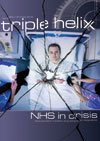Big questions remain
Review by Peter Saunders CMF Chief Executive
The Court of Appeal ruled on 10 November that the NHS in England can fund a drug that can reduce the chance of people catching HIV whilst engaging in high-risk sexual activities. (1)
The once-a-day pill known as PrEP, tradenamed Truvada, consists of two antiretroviral medications used for the treatment of HIV/AIDS (tenofovir and emtricitabine or TDF-FTC) and costs £400 a month per person. The total cost to the health service could be in the order of £10-20m. (2)
According to the CDC (Centers for Disease Control) PrEP is for people who do not have HIV but who are at substantial risk of getting it. It should be used in combination with other 'HIV prevention' methods, such as condoms, but even in these circumstances is not foolproof. (3)
The CDC reports studies that have shown PrEP reduces the risk of getting HIV from sex by more than 90% when used consistently. (4) Among people who inject drugs, PrEP reduces the risk of getting HIV by more than 70% when used consistently. But these figures are what is achievable with good adherence (consistent use), and many of those most at risk are very likely not to adhere to taking the pills regularly.
An authoritative Cochrane review is far less reassuring. Overall, results from four trials (Baeten 2012; Van Damme 2012; Grant 2010; Thigpen 2012) that compared TDF-FTC versus placebo showed a reduction in the risk of acquiring HIV infection by about 51%. (5) Marked differences between the studies were attributed to differences in levels of adherence.
Many will be shocked at the levels of promiscuity reported in these high-risk groups. In one study in the Cochrane database, during screening, participants reported an average of twelve coital acts per week with an average of 21 sexual partners in the previous 30 days.
It is only when these facts are known that the highly addictive nature of high-risk sexual activity, especially amongst male homosexuals, becomes evident. PrEP is not a prevention strategy at all. It is rather a harm reduction strategy aimed at lessening the damage that people addicted to highrisk sexual behaviours are doing to themselves. More akin to clean needles for drug addicts, filter cigarettes for smokers, protective gloves for compulsive burglars or seatbelts for habitual joy-riders.
NHS England was right to challenge this judgment which lumbers them with funding an unproven drug. The only effective way of preventing HIV infections, as opposed to reducing the chance of catching them, is by addressing the high-risk sexual behaviours that lead to them.
































